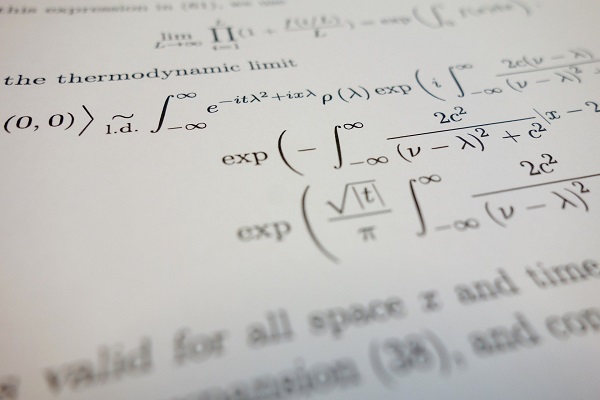A master’s in applied mathematics, one of the highest-paying master’s degrees, can prepare you for a career analyzing quantitative data in any number of different fields. Of course, math and science go hand in hand, and many of the jobs you could get with an applied math degree are in a science field. Having a strong background in one or more areas of science can help you put your applied math degree into practice. Some of the science topics that align well with graduate studies and careers in applied mathematics include physics, computer science, chemistry, biology and engineering.
Physics
IMAGE SOURCE: Pixabay, public domain
As the natural and physical sciences go, physics is an especially math-heavy subject. Physics is the scientific study of matter. The field of physics investigates the energy and force of matter and motion. Calculations in physics are based on mathematical disciplines like calculus and trigonometry, so if you enjoy math enough to pursue a graduate degree in the subject, you are likely to be a good physics student. Whether you major in math and minor in physics or vice versa – or apply to an interdisciplinary bachelor’s degree program in mathematics and physics – you will benefit from developing a knowledge base in the field of science that aims to explain the workings of the universe.
Like many other areas of science, work in the field of physics is divided between theoretical and applied research. Students who want to work in applied mathematics will naturally find applied physics more relevant to their field.
Computer Science
There is a reason computer science is one of the most acceptable non-mathematics majors for getting into a master’s degree in applied mathematics. As a field that began largely as an offshoot of math, computer science still has a lot in common with applied mathematics. The algorithms that accomplish outcomes in computation and computer science applications are based on math, including algebra. Even if you don’t work directly in the field of computer science, as an applied mathematician, you will use computer technology a lot in your work. Computer software is used for analyzing data and modeling quantitative information in many fields.
Learning the skills of computer programming can help you succeed as a mathematician, according to the United States Bureau of Labor Statistics (BLS). The programming languages most widely used by mathematicians include R, C#, Perl and Java, O*NET reported.
Chemistry
Like physics, chemistry is a science that revolves around the study of matter. However, instead of looking primarily at motion and forces, chemistry looks at the properties and composition of matter and how it reacts to, interacts with and combines with other substances. The math involved in chemistry goes far beyond simply measuring out the right amounts of chemical substances to combine. You can also use applied math to describe how chemicals react, as well as matters like quantum mechanics, chromatography and the transfer of mass and heat inside a chemical reactor.
There is an entire area of research in the field of chemistry, known as mathematical chemistry, that primarily revolves around mathematical modeling of chemical processes and reactions.
Biology
The field of biology may have less of a direct relationship with mathematics than other natural sciences, like physics. However, this branch of science that focuses on the study of living organisms is the one most closely related to medicine and healthcare. It makes sense, then, to spend some time studying biology if you want to work in areas of applied mathematics like biostatistics and statistical genetics. Mathematicians who specialize in healthcare applications of math principles often find employment in public health agencies, pharmaceutical manufacturers and hospital facilities, according to the BLS.
Some specific applications of mathematics to the fields of biology and healthcare include the study of disease epidemics and cancer growth patterns and incidence rates.
Engineering
While engineering is not a science per se, it is one of the STEM (science, technology, engineering and mathematics) subjects that emphasize technical skills and knowledge. Engineers draw on the concepts of science and math to design solutions for real-world use, much as an applied mathematician uses math principles for practical applications. Whether they’re developing new chemical solvents, computer software or hardware, machines or building structures, engineers need to understand the mathematical calculations that go into the design process.
A student might major in engineering and then go to graduate school for applied mathematics if they find they need a more advanced mathematics background for the engineering design work they want to do or if they want to pivot to a more analytical role.
Additional Resources
Does My Undergraduate Degree Need to Be in Applied Mathematics to Get a Master’s in It?
What Foreign Language Is Most Needed for an Applied Mathematician?
I Hear That Someone Who Studied Applied Mathematics Can Get Into Actuarial Science. What Is That?

